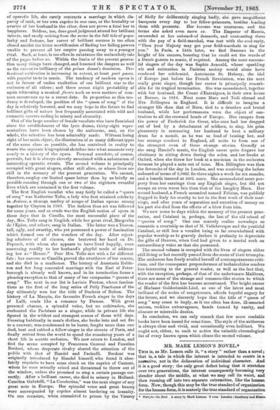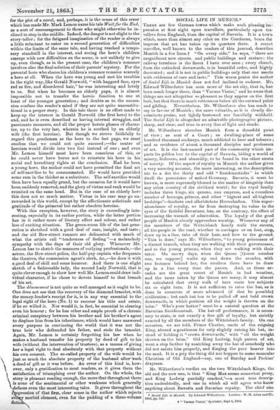MIL MARK LEMON'S NOVEL.* Tins is, as Mr. Lemon calls
it, "a story" rather than a novel; that is, a tale in which the interest is intended to centre in a narrative, not in the delineation of individual character. And it is a good story; the only great defect being that it stretches over two generations, the interest consequently becoming very slender about the middle, at what we may call its waist, and then running off into two separate extremities, like the human form. Now, though this may be the true standard of organization for the human form, it is scarcely the true standard of organization
* Wait for the End. A story b) Mark Lemon. 3 vols. London :Bradbury and Evans.
for the plot of a novel, and, perhaps, it is the sense of this error which has made Mr. Mark Lemon name his tale Wait for the End, as a sort of encouragement ta those who might otherwise be in- clined to stop in the middle. Indeed, the danger is not slight to the story-teller; for the fatigued imagination of the reader is always a little reluctant to enter on a second generation of difficulties within the limits of the same tale, and having reached a tempo- rary standstill in the interest, and seeing the hero's children emerge with new difficulties on the scene, is not unlikely to give up, even though, as in the present case, the children's romance involves also the final solution of their parents' mystery. For the parental hero who shares his children's romance remains scarcely a hero at all. When the hero was young and met his troubles in the right way, like Gerald Norwold, "with haggard face, eyes red as fire, and disordered hair," he was interesting and lovely to us. But when he becomes an elderly papa, it is almost impossible not to transfer the heroic function to one at Least of the younger generation; and doubts as to the succes- sion confuse the reader's mind if they are not quite unconstitu- tional in a proper story. In this tale there is an effort made to keep up the interest in Gerald Norwold (the first hero) to the end, and he is even described as having internal struggles, and passionate moments, and all the proper heroic phases of charac- ter, up to the very last, wherein he is soothed by an elderly wife (the first heroine). But though we strove faithfully to regard this gentleman as the hero to the last page, we must confess that we could not quite succeed ;—the centre of heroism would divide into two foci instead of one ; and even Mr. Lemon himself must have been conscious of this, or he could never have borne not to reinstate his hero in his social and hereditary rights at the conclusion. Had he been a young hero, the author could not have permitted the final act of self-sacriflce to be consummated. He would have provided some ram in the thicket as a substitute. The self-sacrifice would then hare been equally grand, but the occasion for it would have been suddenly removed, and the glory of virtue and rank would be reunited on the same head. But in the case of an elderly hero this does not so much matter. Virtue in his case may go un- rewarded in this world, except by the affectionate solicitude and gratitude of the primeval but rather obsolete heroine.
With this exception, however, the story is exceedingly inte- resting, especially in its earlier portion, while the latter portion has in it rather more of literary effect and colour, and rather less of exciting situation. The green-room life of the last gene- ration is sketched with a good deal of ease, insight, and taste ; and the old Bow-street runners are delineated with much of what the artists call "tenderness of feeling "—a melancholy sympathy with the days of their old glory. Whenever Mr. Lemon has to sketch the manners of outlying professionals,—the actors, the Bow-street police, the half-pay captain who frequents the theatres, the commission agent's clerk, &c.,—he does it with a good deal of skill and some humour. And there is one slight sketch of a fashionable lady, the second Lady Norwold, that is quite clever enough to show how well Mr. Lemon could draw indi- vidual character, if he chose to devote himself to that branch of his art.
The denouement is not quite as well managed as it ought to be. One does not see that the recovery of the diamond bracelet, with the money-lender's receipt for it, is in any way essential to the legal right of the hero (No. 1) to recover his title and estate, if he so willed it. Nor would it, in fact, be essential to clearing even his honour ; for he has other and ample proofs of a chronic criminal conspiracy between his brother and his brother's agent to displace him from his inheritance, which would have answered every purpose in convincing the world that it was not the true heir who defrauded his father, and stole the bracelet. Again, Mr. Lemon is certainly forgetting his law when he makes a husband transfer his property by deed of gift to his wife (without the intervention of trustees), as a means of giving her a legal right to deal absolutely with that property without his own consent. The so-called property of the wife would be just as much the absolute property of the husband after -such
a deed of gift as it was before. An error of this kind is, how- ever, only a gratification to most readers, as it gives them the i satisfaction of triumphing over the author. On the whole, the story is pleasant reading enough, the more that throughout there is none of the sentimental or other weakness which generally \ defaces even the most interesting tales. It gives throughout the s pression of that firm, clear sense in the author which rejects ev morbid element, even for the padding of a time-volume fictio































 Previous page
Previous page